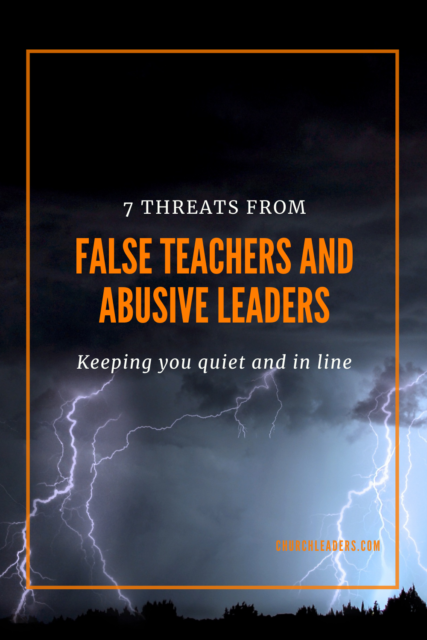False teachers and abusive leaders need to maintain their power. Therefore, they use a series of threats to keep people quiet and in line. Get out of line? You might hear one of the seven statements I’ve listed below.
7 Threats From False Teachers and Abusive Leaders
Some people who aren’t false teachers or abusers do use some of these from time to time. For example, someone may be accused of behaving like a “Pharisee” because they’re relying on legalism to achieve their righteousness. That isn’t in the context here. This particular post is in the context of a pastor or church leader who is approached by a well-meaning church member concerning teachings that are not faithful to Scripture and are twisted for a desired end.
1. Don’t Put God in a Box
This phrase is usually directed at those who are trying to convince their church leader to keep his or her teaching in line with Scripture. You may hear this kind of statement after congregants push back against a pastor who gets up one Sunday and starts tossing out random prophecies that don’t come true (or make sense). Another example would be a concerned church member who says, “Pastor, that’s not exactly what God said He would do in His word.” The pastor would respond, “Don’t put God in a box.” The pastor may even tag on one of these other statements to beef up his domineering response.
2. Touch Not the Lord’s Anointed
This threat tends to be used when venerated leaders are opposed for their false and abusive teachings. Their defense? They claim to be “anointed” by God and immune from any accountability and that if you criticize them God will bring judgment upon you. Those who blindly follow them will usually echo this phrase as well as they warn a whistle-blower to keep quiet. Should you ever hear this threat you have nothing to fear. When you “mark” someone who is teaching false things, you are not touching the Lord’s anointed. You are obeying the Lord Himself (Romans 16:17-18).
3. Don’t Be a Pharisee
The Pharisees were not necessarily the best example of what true worship looks like. Even though they were very devout, they were legalistic, twisted God’s word, and burdened people with manipulative teachings that were not a part of God’s Law. They were known to control people with their spiritual arrogance and elitist mentality. Without question, they were a questionable group. Therefore, it’s not surprising when the term “Pharisee” is used in a pejorative manner. This threat from a false teacher gets used when someone holds them accountable for Scripture twisting or loose living. The false teacher will respond claiming, “Don’t be a Pharisee!” Ironically, it is false teachers and abusers who are pharisaic. They add to God’s word, they use their authority to exploit people, and are hypocrites.


